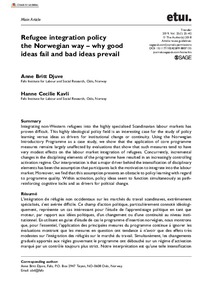Refugee integration policy the Norwegian way – why good ideas fail and bad ideas prevail

Djuve, Anne Britt ; Kavli, Hanne Cecilie
Transfer. European Review of Labour and Research
2019
25
1
February
25-42
refugee ; social integration ; welfare state ; labour market
Migration
https://doi.org/10.1177/1024258918807135
English
Bibliogr.
"Integrating non-Western refugees into the highly specialised Scandinavian labour markets has proven difficult. This highly ideological policy field is an interesting case for the study of policy learning versus ideas as drivers for institutional change or continuity. Using the Norwegian Introductory Programme as a case study, we show that the application of core programme measures remains largely unaffected by evaluations that show that such measures tend to have very modest effects on the labour market integration of refugees. Concurrently, incremental changes in the disciplining elements of the programme have resulted in an increasingly controlling activation regime. Our interpretation is that a major driver behind the intensification of disciplinary elements has been the assumption that participants lack the motivation to integrate into the labour market. Moreover, we find that this assumption presents an obstacle to policy learning with regard to programme quality. Within activation, policy ideas seem to function simultaneously as path-reinforcing cognitive locks and as drivers for political change."
Digital;Paper
The ETUI is co-funded by the European Union. Views and opinions expressed are however those of the author(s) only and do not necessarily reflect those of the European Union or the ETUI.